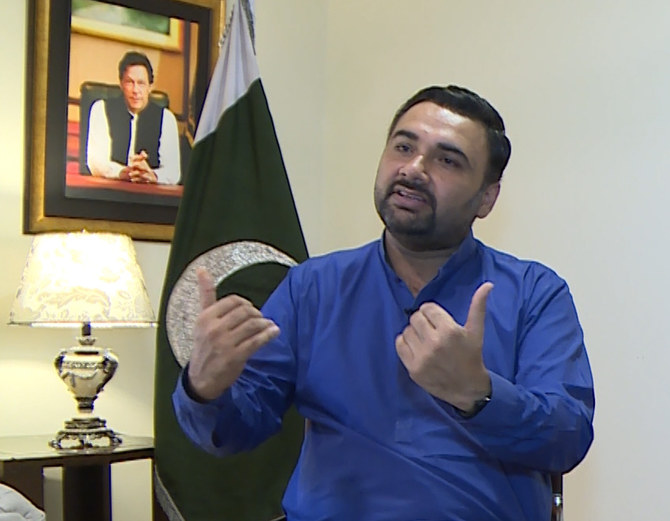ISLAMABAD: The chief of Pakistan’s polio eradication program has thanked social media giant Facebook for removing misinformation from its platforms that discourages vaccination against the virus and endangers the lives of Pakistan’s 270,000 polio vaccinators and other officials involved in the anti-polio campaign.
Complete eradication in Pakistan, one of only three countries in the world where polio still persists, has been hampered by misinformation online, with some Muslim clerics and propaganda videos on social media platforms peddling stories that the vaccines are part of a Western plot to make Muslims sterile and that campaign workers are Western spies. Militant groups have killed nearly 100 polio health workers and their guards since 2012.
Facebook Inc, which along with other social media companies, has faced growing pressure in recent months over spurious content spread on its platform.
In a letter shared exclusively with Arab News on Saturday, Babar bin Atta, the Prime Minister’s Focal Person on Polio Eradication, said the country’s anti-polio initiative “would like to extend its sincere appreciation to Facebook in helping effectively regulate anti-vaccine content.”
“With the upsurge of anti-vaccine content across online platforms worldwide, it has been incredibly reassuring and encouraging for the entire Pakistan Polio Eradication Initiative to see Facebook proactively ramp up its efforts and policies to combat vaccine misinformation and harmful content,” Atta said.

In a letter shared exclusively with Arab News on Saturday, June 22, 2019, Babar bin Atta, the Prime Minister’s Focal Person on Polio Eradication, said the country’s anti-polio initiative “would like to extend its sincere appreciation to Facebook in helping effectively regulate anti-vaccine content.”
In April, religious hard-liners in Pakistan’s northwestern Khyber Pakhtunkhwa province raised a scare on social media through false rumors that some children were being poisoned from contaminated polio vaccines. Word on a number of platforms said some children had died.
The rumors triggered mass panic in the province as mobs burned a village health center, blocked a highway and pelted cars with stones. Medical workers were harassed and threatened and panicked parents rushed their children to hospitals, overwhelming health authorities. In Peshawar alone, about 45,000 children were brought to hospitals complaining of nausea and dizziness.
As a result of the false reports, families of hundreds of thousands of children in Khyber Pakhtunkhwa and elsewhere refused to participate in the May campaign to eradicate the virus that can cause paralysis and death.
Since then, Facebook has worked to remove up to 700 pages, links and profiles spreading spurious content on its platform, according to the office of the Prime Minister’s Focal Person on Polio Eradication.
“We are grateful for Facebook’s efforts to tackle misinformation through fact-checking … debunking several false claims that have been circulating around the polio vaccine,” Atta said in his letter to Facebook. “Your brilliant efforts in combating misinformation online have been indispensable in helping us reach out to concerned parents and caregivers and forge an enabling environment for vaccine against polio.”
Atta also said Facebook’s support had helped safeguard officials involved in the eradication campaign, saying that as of June 20, polio teams had been able to successfully vaccinate almost 80 percent targeted children in a sub-national campaign launched in June “without any incidence of violence toward our health workers.”
He said Pakistan could not achieve its goal of ending poliovirus transmission by 2020 without the support of partners like Facebook and hoped the “productive partnership” would continue.
In an exclusive statement to Arab News in May, Facebook Inc. had said it was “fully committed” to the safety of Pakistani users of its platforms and was taking steps to reduce misinformation about anti-polio campaigns as Pakistan makes a final push to eradicate the disease.
“We regularly review reports for vaccine misinformation, whether those reports come from our community or the government,” a Facebook spokeswoman told Arab News.
Outlining steps to combat misinformation, the representative said the company removed any content that violated Community Standards.
“If we find that the content does indeed contain misinformation about vaccinations, we reduce its distribution by reducing the News Feed and Search ranking of the Group/Page that shared it and by making sure we are not recommending this content on Facebook nor Instagram,” the spokeswoman said.
“We also rely on the work of leading global health organizations, such as the World Health Organization and the US Centers for Disease Control and Prevention, who have publicly identified verifiable vaccine hoaxes. We will continue to work with Pakistan’s government and world health organizations on this important issue,” the spokeswoman added.
According to a Facebook official with knowledge of the campaign against vaccine misinformation, the company had recently been working to reduce organic distribution on vaccine misinformation content and to substantially lower the distribution of Groups or Pages on Facebook that propagate misinformation.
This includes working to remove offending Groups and Pages from recommendation surfaces on the platform (such as “Groups You Should Join”) and from predictions for when users type into search, the Facebook official who declined to be named said.
It also involves implementing changes so that Facebook doesn’t show or recommend content that contains misinformation about vaccinations on Instagram Explore or hashtag pages, she said. Content from the offending Groups and Pages is also demoted in News Feed, using ranking systems and the Groups and Pages themselves are also reduced in search results.
The Facebook source also said the company was taking taking additional steps to address hoaxes related to vaccines in advertising, investing in systems to better ensure that ads that include misinformation about vaccines are rejected. The company is also removing a number of ad targeting options, such as “vaccine controversies,” that might have been used to help spread misinformation, the official said.
















